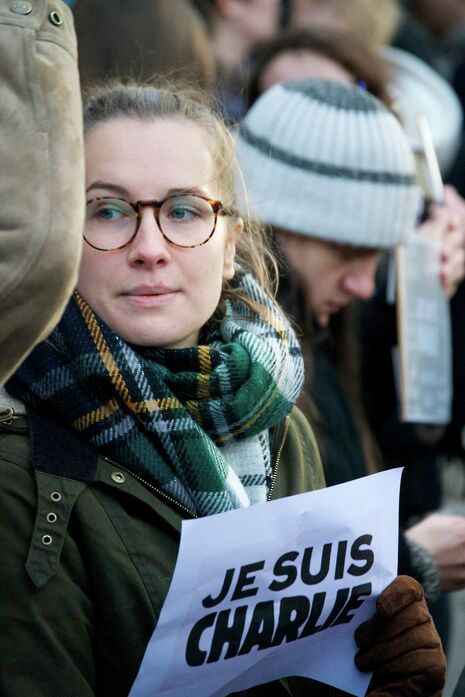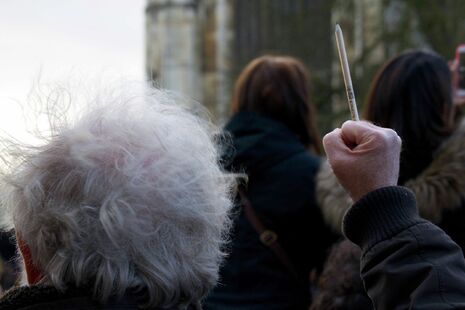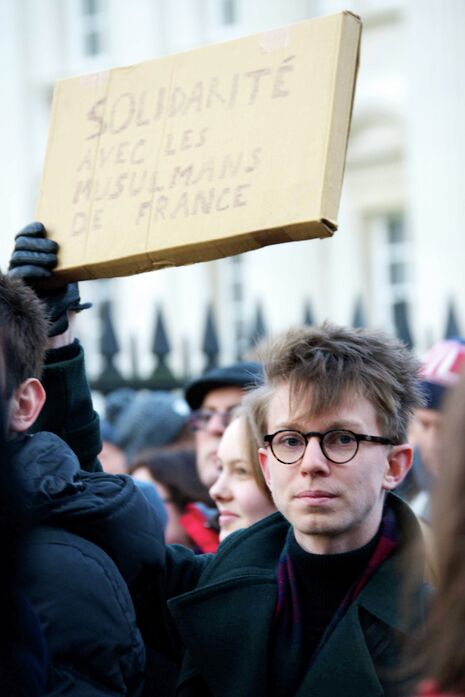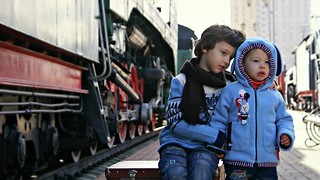Cambridge est Charlie
Cambridge shows its support for victims of Paris attacks

On Sunday 11th January, Cambridge rallied in unity against three days of terrorist attacks in Paris, which left 17 innocent people dead.
The events, which have since dominated the international press, appear to have struck deep within the Cambridge community, who came together on Sunday to show their support for the victims of the attacks.
The rally, organised by Alliance Française de Cambridge outside Great St Mary’s church, brought together hundreds from in and around the city. Many had brought pens, placards and banners, lots of which were homemade, whereas others held printed copies of the viral #JeSuisCharlie image.
Marchers were a mix of young and old, of students, professors and residents. All quietly gathered in tribute to those who lost their lives at the hands of at least three terror suspects over three days in France’s capital. Those killed included journalists of satirical magazine Charlie Hebdo, police officers at the scene, and shoppers held hostage at a kosher supermarket.

The atmosphere was sombre, with a French flag drooping across the iron fencing of Senate House. Yet amidst the sobriety was defiance. Those interviewed by Varsity were preoccupied not so much by freedom of the press, but rather by the ever more oppressive environment for the nation’s sizeable Muslim population. The response was unanimous: France will not fall to fundamentalists, but stand strong with French Muslims. Some, although categorically condemning the attacks, questioned the moral merit of Charlie Hebdo, considering that some of its cartoons were, in their view, racist.
Clare College’s student publication, Clareification, drew strong criticism from some when it republished satirical cartoons of Prophet Mohammed in February 2006. Varsity reported at the time that one Clare student described the cartoon as “one of the most offensive things I have ever seen.” Charlie Hebdo’s publication of the cartoons led to its editor Philippe Val being sued by the Grand Mosque of Paris, though he was acquitted of inciting hatred against Muslims.
At the rally, Matteo Mirolo of Fitzwilliam College said: “I think it’s important to start to reconstruct the country after what has happened because there will be a ‘before’ and ‘after’ period.” For him, the ‘JeSuisCharlie’ movement “shows the unity of the French people,” and he stressed that his thoughts also rested with “the Muslim people of France… and the Jewish people who have once again been the target of anti-Semitism.”
The attack on the kosher supermarket in Porte de Vincennes just two days after the initial shootings was seen to add another dimension to recent events.
Prompting another outpouring of support on social media, it has led many to display #JeSuisJuif alongside the already popular #JeSuisCharlie and #JeSuisAhmed hashtags, the latter referring to the Muslim police officer Ahmed Merabet who was shot dead while patrolling the streets outside the Charlie Hebdo offices.

A minute’s silence was held outside Senate House followed by a round of applause led by an organiser of the rally from Alliance Française. She said the rally was important because “it’s our liberty, it’s our children, it’s your future.” In this, she managed to capture the main themes of the discussions that took place in the street afterwards among a crowd bound by solemnity but looking to build a stronger France and international community in the aftermath of tragedy.
Guillaume Guilbaud, a Parisian who also attended the event, spoke of the attacks on journalists as “an attack again on the rights for which we have been fighting for, for centuries now.” For him, being present at the march was “a way to say thanks to all those people that are fighting and know that their life is in danger.”
It’s “easy, it’s not a lot... [it’s] the minimum I could do,” Guilbaud went on, “I couldn’t be in Paris today.”

This feeling of solidarity with the international condemnation of the Paris attacks was strong. Amidst the signs and other frequent references to social media, where the outpouring of support has come to be one of the defining features of the attacks, it was difficult to forget that the 400 or so people gathered outside Senate House represented only one of the many rallies across Britain, France, and the world. Forty-four world leaders, among them David Cameron, had also assembled in Paris to take part in a mass demonstration, and the resonance of this was not lost on Sunday afternoon in King’s Parade.
Among those at the gathering was Amanda Ekström of Robinson College, who was in Paris at the time of the attacks. She said “it’s very important to support the freedom of expression,” and voiced hope for resulting social movements.
What struck Amanda most, though, was the global display of solidarity with phrases like ‘JeSuisCharlie’ and ‘Not Afraid’. “It’s very beautiful how people around the world have reacted.”
Despite the solemnity of the march, Wednesday’s publication of the first edition of Charlie Hebdo since the attacks, featuring a new cartoon of Mohammed on the cover and lampooning the world leaders gathered in Paris, shows the magazine’s intention not to become the sanitised Charlie of the ‘JeSuisCharlie’ movement.
 Comment / Bonnie Blue is the enemy, not the face, of female liberation13 October 2025
Comment / Bonnie Blue is the enemy, not the face, of female liberation13 October 2025 News / Cambridge climbs to third in world Uni rankings11 October 2025
News / Cambridge climbs to third in world Uni rankings11 October 2025 News / Join Varsity this Michaelmas13 October 2025
News / Join Varsity this Michaelmas13 October 2025 Features / How to spend a Cambridge summer12 October 2025
Features / How to spend a Cambridge summer12 October 2025 Features / Beyond reality checkpoint: local businesses risking being forced out by Cambridge’s tourism industry15 October 2025
Features / Beyond reality checkpoint: local businesses risking being forced out by Cambridge’s tourism industry15 October 2025









